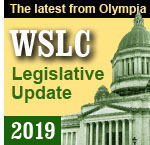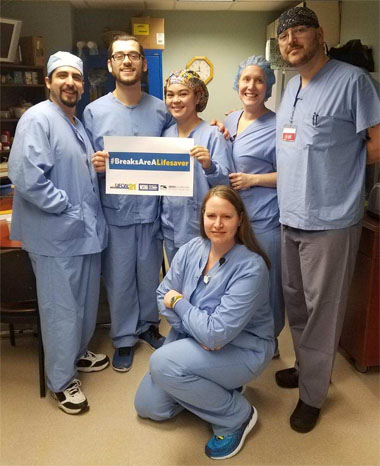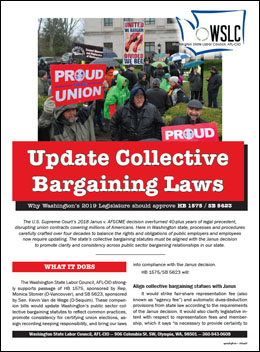STATE GOVERNMENT
Message to state senators: Breaks Are A Lifesaver
Plus the revenue forecast and our budget, and a status report on labor bills
 This is the latest edition of the weekly Legislative Update newsletter from the Washington State Labor Council, AFL-CIO. If you didn’t receive it via email, subscribe to The Stand and you’ll get the Legislative Updates and all of the WSLC’s other news from Olympia.
This is the latest edition of the weekly Legislative Update newsletter from the Washington State Labor Council, AFL-CIO. If you didn’t receive it via email, subscribe to The Stand and you’ll get the Legislative Updates and all of the WSLC’s other news from Olympia.
OLYMPIA (March 25, 2019) — When you work an extended period without rest, you are more likely to make mistakes. Everybody knows this. It’s just common sense. But when you’re a frontline health care worker, mistakes can be a matter of life and death.
 Nurses must administer proper dosages of medication, surgical techs must perform key functions during operations, and other frontline healthcare workers support essential care and treatment that will determine whether patients recover — or don’t. Numerous studies have proven the link between long, uninterrupted hospital work shifts and medical errors/adverse outcomes not only for patients, but also for the health care employees themselves in terms of work-related injuries.
Nurses must administer proper dosages of medication, surgical techs must perform key functions during operations, and other frontline healthcare workers support essential care and treatment that will determine whether patients recover — or don’t. Numerous studies have proven the link between long, uninterrupted hospital work shifts and medical errors/adverse outcomes not only for patients, but also for the health care employees themselves in terms of work-related injuries.
And yet under current Washington state law, hospitals can effectively deny rest periods for their staff, increasing these risks for patients and health care workers. Hospital administrators can — and do — deny frontline health care workers uninterrupted meal and rest breaks.
SHB 1155, sponsored by Rep. Marcus Riccelli (D-Spokane), is patient safety legislation that would ensure these health care workers receive uninterrupted meal and rest breaks and close a dangerous loophole in the mandatory overtime law. The bill, which passed the House on a bipartisan 63-34 vote, has passed the Senate Labor and Commerce Committee, and will be heard Tuesday at 3:30 p.m. in the Senate Finance Committee.
TAKE ACTION! Please visit BreaksAreALifesaver.org to send your state senator a message to vote YES on this important patient-safety legislation. Supported by the Washington State Nurses Association, UFCW 21, SEIU Healthcare 1199NW and many other public health advocates, SHB 1155 will help ensure our nurses and caregivers are well-rested and alert, and help reduce medical errors and ensure quality care for Washingtonians.
 Frontline health care workers from across Washington state have been contacting their state legislators, particularly in rural areas with less access to medical delivery services, to urge support for SHB 1155 to promote high quality and safe medical care. (Pictured here are frontline staff at Lourdes Medical Center in Pasco. See #BreaksAreALifesaver for more examples. And post your own!)
Frontline health care workers from across Washington state have been contacting their state legislators, particularly in rural areas with less access to medical delivery services, to urge support for SHB 1155 to promote high quality and safe medical care. (Pictured here are frontline staff at Lourdes Medical Center in Pasco. See #BreaksAreALifesaver for more examples. And post your own!)
Nurses and frontline health care workers always find time to provide the kind of care and comfort that leaves an impression on patients and their families. They take good care of us, and we need to take good care of them.
Please send a message to your state senator today and urge passage of SHB 1155.
More upside-down revenue doesn’t solve our problems
Last week, the state Revenue Forecast Council released its latest forecast and projected that the state would generate $553.5 million more in revenue over the next two years than previously estimated. Given Washington’s worst-in-the-nation upside-down tax code, working families will be paying the lion’s share of the additional revenue.
It’s welcome news to be sure, but as the House’s chief budget writer Rep. Timm Ormsby (D-Spokane) said, “It doesn’t take away from the arithmetic problem that we came here with.”
Legislators arrived in Olympia with extraordinary funding challenges for the biennial budget, including necessary investments in special education, mental health, and to address homelessness and opioid addiction. Those demands along with the rising cost of maintaining existing services for a growing state population means that, as House Democrats release their budget proposal this week, additional revenue will be required.
Hopefully, a significant step can be made to balance our upside-down tax code. That means any additional revenue should come from those who are not currently paying their fair share: Washington’s richest households.
In nearly all states the wealthiest 1 percent pay taxes on profits from stocks, bonds, and other significant investments — but not in Washington. Ending the state tax break on capital gains is one way we could both balance our upside-down tax code and ensure we have the resources we need to invest in our shared priorities.
Status report on labor-supported bills
Here is a quick status report on labor-supported bills that remain alive. (This is not a comprehensive list, it is just those that have been described in previous editions of this newsletter.)
 UPDATE COLLECTIVE BARGAINING LAWS — HB 1575, sponsored by Rep. Monica Stonier (D-Vancouver), would update Washington’s collective bargaining statutes to reflect common practices, promote consistency for certifying union elections, assign record-keeping responsibility, and generally bring our state laws into compliance with the Janus decision. Read more about this bill or download this one-pager for more details. — Passed House, 57-41. In Senate Labor & Commerce. Hearing held.
UPDATE COLLECTIVE BARGAINING LAWS — HB 1575, sponsored by Rep. Monica Stonier (D-Vancouver), would update Washington’s collective bargaining statutes to reflect common practices, promote consistency for certifying union elections, assign record-keeping responsibility, and generally bring our state laws into compliance with the Janus decision. Read more about this bill or download this one-pager for more details. — Passed House, 57-41. In Senate Labor & Commerce. Hearing held.
ALLOWING AAGs TO JOIN TOGETHER — SB 5297, sponsored by Sen. Sam Hunt (D-Olympia), would extend collective bargaining rights to assistant attorneys general. Read more about it. — Passed Senate, 27-18. In House Labor & Workforce Standards. Hearing held.
HEALTH CARE: PATHWAY TO UNIVERSAL COVERAGE — SB 5822, sponsored by Sen. Emily Randall (D-Bremerton), would set up a work group to make recommendations for publicly funded, privately delivered health care for all Washington state residents. The group will have representatives from various stakeholders in the state’s healthcare system, including from labor with knowledge of Taft-Hartley trusts, and would report its finding and make recommendations to legislators by Nov. 15, 2020. — Passed Senate, 28-21. In House Health Care & Wellness Committee. Hearing: March 26.
HEALTH CARE: STANDARDIZED INSURANCE PLANS — SB 5526 and HB 1523, sponsored by Sen. David Frockt (D-Seattle) and Rep. Eileen Cody (D-Seattle), aim to increase the availability of quality, affordable private health coverage in the individual market. They would require the state to create a standardized insurance plans and contract with health insurance carriers to offer those plans. — SB 5526 passed Senate, 36-13, and is in Health Care & Wellness Committee (hearing on March 26). HB 1523 passed House, 57-41, and is in Senate Health & Long Term Care. (Hearing held.)
HEALTHY ENVIRONMENT FOR ALL (HEAL) ACT — SB 5489, sponsored by Sen. Rebecca Saldaña (D-Seattle), creating a definition of environmental justice, directing agencies to address environmental health disparities, and creating a task force to recommend strategies for state agencies to incorporate environmental justice principles into their responsibilities. — Passed Senate, 27-21. In House State Government & Tribal Relations. Hearing held.
H-2A OVERSIGHT — SB 5438, sponsored by Sen. John McCoy (D), will create some state oversight of the H-2A program, the federal program allows the agricultural industry to bring foreign “guest” farmworkers into the country on temporary work visas. Read more about it. — Passed Senate, 26-21. In House Labor & Workplace Standards. Hearing: March 28.
INTEREST ARBITRATION FOR CAMPUS POLICE — SB 5022, sponsored by Sen. Karen Keiser (D-Kent), would provide interest arbitration for police officers at four-year colleges and universities. Read more about it. — Passed Senate, 45-2. In House Labor & Workplace Standards. Hearing held.
INTEREST ARBITRATION FOR CORRECTIONS OFFICERS — SB 5021, sponsored by Rep. Kevin Van De Wege (D-Sequim), would provide interest arbitration for employees at the Department of Corrections. Read more about it. — Passed Senate, 47-0. In House Labor & Workplace Standards. Hearing held.
KEEP WASHINGTON WORKING ACT — SB 5497, sponsored by Sen. Lisa Wellman (D-Mercer Island). establishes a statewide policy supporting Washington state’s economy and immigrants’ role in the workplace, and ensures their access to state services. It develops strategies to protect our immigrant workforce, and secure their rights as workers and members of our communities. Read more about it. — Passed Senate, 30-16. In House Civil Rights & Judiciary. Hearing held.
LONG-TERM CARE TRUST ACT — HB 1087, sponsored by Rep. Laurie Jinkins (D-Tacoma), would establish a Long-Term Care Trust to reduce the biggest uninsured risk Washingtonians now face. It will help protect future taxpayers from the cost of long-term care, both to their families and to the state budget. Most of all, it would give families the security of knowing they will get the care they need when they need it most without the added stress of how to pay for it. Read more about it. — Passed House, 63-33. In Senate Health & Long-Term Care. Hearing held.
 100% CLEAN ENERGY — SB 5116, sponsored by Sen. Reuven Carlyle (D-Seattle), would transition all electric utilities away from coal-fired power by 2026 and would make all retail sales of electricity greenhouse gas neutral by Jan. 1, 2030. A committee amendment to this bill reflects that tax incentives are tied to important labor standards like prevailing wage, apprenticeship utilization, preferred hire for women- and minority-owned businesses. Also, higher rebates are available for signing a project labor or community workforce agreements. — Passed Senate, 28-19. Passed House Environment & Energy. Now in House Finance. Hearing held.
100% CLEAN ENERGY — SB 5116, sponsored by Sen. Reuven Carlyle (D-Seattle), would transition all electric utilities away from coal-fired power by 2026 and would make all retail sales of electricity greenhouse gas neutral by Jan. 1, 2030. A committee amendment to this bill reflects that tax incentives are tied to important labor standards like prevailing wage, apprenticeship utilization, preferred hire for women- and minority-owned businesses. Also, higher rebates are available for signing a project labor or community workforce agreements. — Passed Senate, 28-19. Passed House Environment & Energy. Now in House Finance. Hearing held.
PLAN 2 DEFAULT — SB 5360 / HB 1308, sponsored by Sen. Steve Conway (D-Tacoma) and Rep. Derek Stanford (D-Bothell), would change the default retirement plan for public workers from Plan 3 to Plan 2, if they fail to choose a plan within 90 days, to ensure more retirees are protected by defined-benefit pensions. — SB 5360 passed Senate, 39-9. In House Appropriations (hearing held). HB 1308 passed House, 74-22. Passed Senate Ways & Means.
REGULATE NON-COMPETITION CONTRACTS — SB 5478 and HB 1450, sponsored by Sen. Marko Liias (D-Lynnwood) and Rep. Derek Stanford (D-Bothell), would regulate non-competition agreements in Washington state to ensure they aren’t being used to exploit workers and deny them the opportunities to find better jobs. Read more about it. — Both bills were amended. SB 5478 passed Senate, 30-18. In House Labor & Workplace Standards (hearing held). HB 1450 passed House, 55-41. In Senate Labor & Commerce.
WORK VIOLENCE / SEXUAL HARASSMENT — SB 5258, sponsored by Sen. Karen Keiser (D-Kent), requires companies that employ custodians, security guards, hotel or motel housekeepers, or others who spend a majority of their working hours alone to adopt a sexual harassment policy, provide sexual harassment training, provide a list of resources to employees, and provide panic buttons to isolated workers. — Passed Senate, 47-0. In House Labor & Workforce Standards. Hearing held. ALSO HB 1056, sponsored by Rep. Gina Mosbrucker (R-Goldendale), would create a task force to identify the role of the workplace in helping curb domestic violence. — Passed House 97-0. In Senate Labor & Commerce. Hearing held.
 The WSLC Legislative Update is a weekly newsletter of the Washington State Labor Council, AFL-CIO. It describes legislation of particular concern to Washington’s working families during throughout the state legislative session. Links to previous editions are available here. Additional legislative news is posted at The Stand’s State Government section.
The WSLC Legislative Update is a weekly newsletter of the Washington State Labor Council, AFL-CIO. It describes legislation of particular concern to Washington’s working families during throughout the state legislative session. Links to previous editions are available here. Additional legislative news is posted at The Stand’s State Government section.






